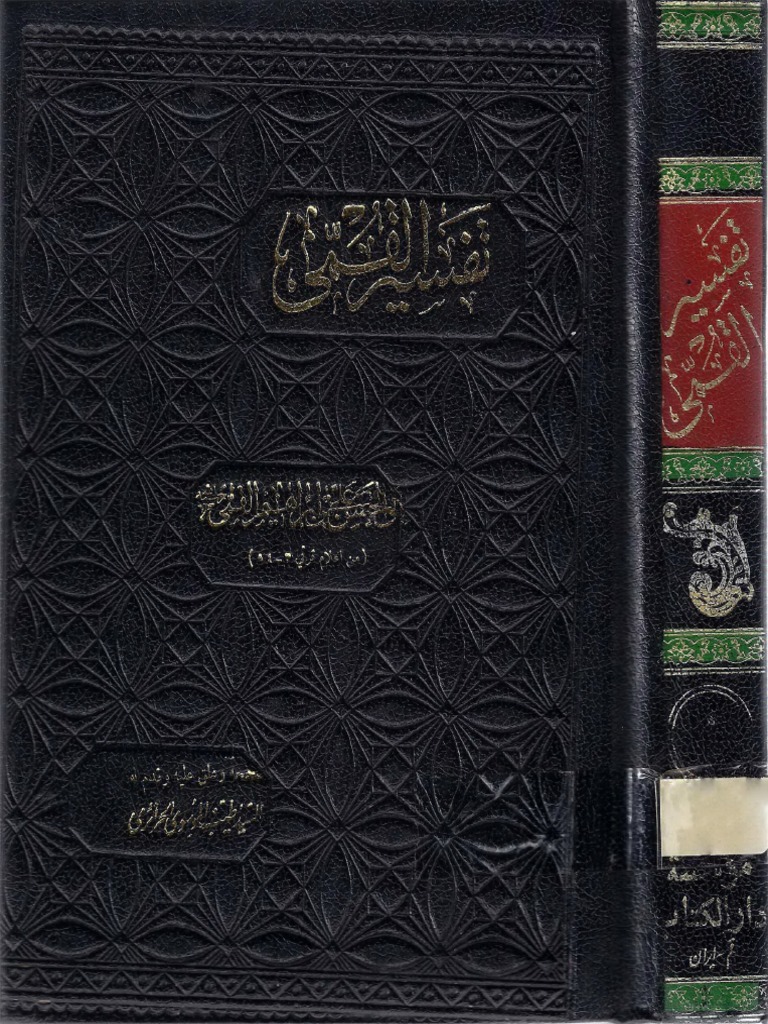The Tafsir al-Qummi, an essential text in Shia Islamic scholasticism, serves as a crucial interpretative source of the Quran. Compiled by the esteemed 9th-century Shia scholar, Abu al-Hasan Ali ibn Ibrahim al-Qummi, this exegesis epitomizes a distinctive approach to understanding the divine text, intertwining theology, history, and cultural nuances. But what makes this specific tafsir stand out in the pantheon of Islamic commentaries? Moreover, how might the contemporary reader grapple with its teachings in the context of modern challenges? This exploration aims to elucidate the significance of Tafsir al-Qummi within Shia doctrine and its implications for both understanding scripture and navigating contemporary dilemmas.
At its core, the Tafsir al-Qummi is not merely an academic exercise; it represents the integration of divine revelation with the lived experiences of the Shia community. This interpretative lens is characterized by a profound reliance on narrations from the Prophet Muhammad and the Imams, particularly emphasizing the latter's role as intermediaries in conveying divine wisdom. Al-Qummi's work is replete with Hadiths that elucidate Quranic verses, thereby weaving a rich tapestry of theological insight that is distinctive to Shia thought.
One of the hallmark features of Tafsir al-Qummi is its methodology. Al-Qummi employs both contextual and linguistic analyses to derive meanings, often elucidating the historical circumstances surrounding specific revelations (asbab al-nuzul). This practice not only enriches the reader's understanding of the text but also fosters a dynamic engagement with the Quran, urging readers to consider the relevance of its teachings in varied contexts. Through this hermeneutic approach, the text prompts a broader inquiry: how can ancient wisdom inform contemporary ethical considerations in a rapidly evolving world?
Within the Tafsir, one can observe a robust discourse on moral and ethical principles that are central to Shia beliefs. For instance, al-Qummi often highlights verses that pertain to justice, compassion, and community solidarity. These themes resonate deeply within Shia traditions, which emphasize social responsibility and collective well-being. This emphasis raises poignant questions: how do these values manifest in today's socio-political climate? Are contemporary Shia communities effectively upholding these principles when faced with challenges such as inequality, sectarian strife, and global unrest?
The Tafsir al-Qummi also navigates intricate theological concepts, particularly concerning the nature of divine authority and the attributes of God. Al-Qummi's interpretations are particularly significant for their assertion of the Imamate, emphasizing the immutable relationship between the Quran and the teachings of the Imams. This connection serves to fortify Shia identity, yet it simultaneously invites scrutiny. In an era where pluralism and interfaith dialogue are increasingly prominent, how can Shia interpretations harmonize with other Islamic schools of thought while maintaining their unique characteristics?
Furthermore, al-Qummi’s tafsir is notable for its inclusivity of various narrations, some of which may not align with Sunni interpretations. This reflects a broader Shia commitment to preserving diverse voices within the Islamic discourse. It poses an intriguing challenge: can the inclusive nature of Tafsir al-Qummi serve as a model for inter-political cooperation among different Islamic sects? In bridging gaps through shared ethical frameworks, could the teachings of al-Qummi facilitate a more harmonious coexistence in an often-divisive landscape?
An essential aspect of the commentary includes the exploration of eschatological themes—discussions surrounding the Day of Judgment, the afterlife, and the return of the Mahdi. Al-Qummi's interpretations of these concepts provide followers with a sense of hope and purpose. However, it raises important questions regarding the balance between anticipation and action: while believers are encouraged to await the Mahdi’s return, how can they actively contribute to societal reform in the interim? This question compels a reevaluation of passive versus active engagement within religious practice.
The relevance of Tafsir al-Qummi extends beyond theological discourse; it acts as a catalyst for community mobilization. The moral imperatives derived from the text can inspire grassroots movements that align with Shia values of social justice and equity. Yet, as contemporary Shia activists strive to embody these principles, they must contend with the complexities of modernity, including technological advancements and differing worldviews. Can the teachings of al-Qummi inspire adaptive frameworks for advocacy and reform that remain true to core beliefs while being responsive to contemporary issues?
Moreover, the educational implications of Tafsir al-Qummi cannot be overlooked. As an instructional tool, its insights can be instrumental in shaping the pedagogical approaches of Shia religious institutions. Engaging students with the text's multidimensional layers fosters critical thinking and encourages personal reflection upon ethical dilemmas faced in daily life. The challenge lies in ensuring that these teachings are rendered accessible and relevant to younger generations navigating an increasingly complex societal landscape.
In conclusion, the Tafsir al-Qummi represents a rich reservoir of knowledge and spiritual guidance for Shia adherents. Its unique interpretative techniques and emphasis on moral and theological principles hold profound relevance in contemporary discourse. As communities grapple with the challenges of modernity, the teachings encoded within this text can inspire both introspection and action. The interplay between ancient wisdom and contemporary societal challenges invites continual exploration and engagement, prompting us to ask: in what ways can the legacy of Tafsir al-Qummi not only inform our understanding of the divine but also empower us to enact meaningful change in our world today?


